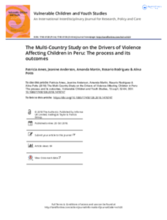Abstract
This article presents the Peru results as part of the Multi Country Study on the Drivers of Violence Affecting Children. The article provides an overview of the Peruvian context, the methodology of the study and research results and impact attributable to both the Study’s products and its processes. Results show a high prevalence of violence against children in Peru and various factors that contribute to this situation. The article also examines an action-oriented, locally led approach that served to transform decision-making (from denial to acknowledgement) to make visible how violence affects children in the country. The article concludes by examining the governance of the Study, based on the relationships built among key stakeholders and how it ultimately opened the space for open discussion of research results and change in public policy and practice to confront and prevent violence affecting children.

